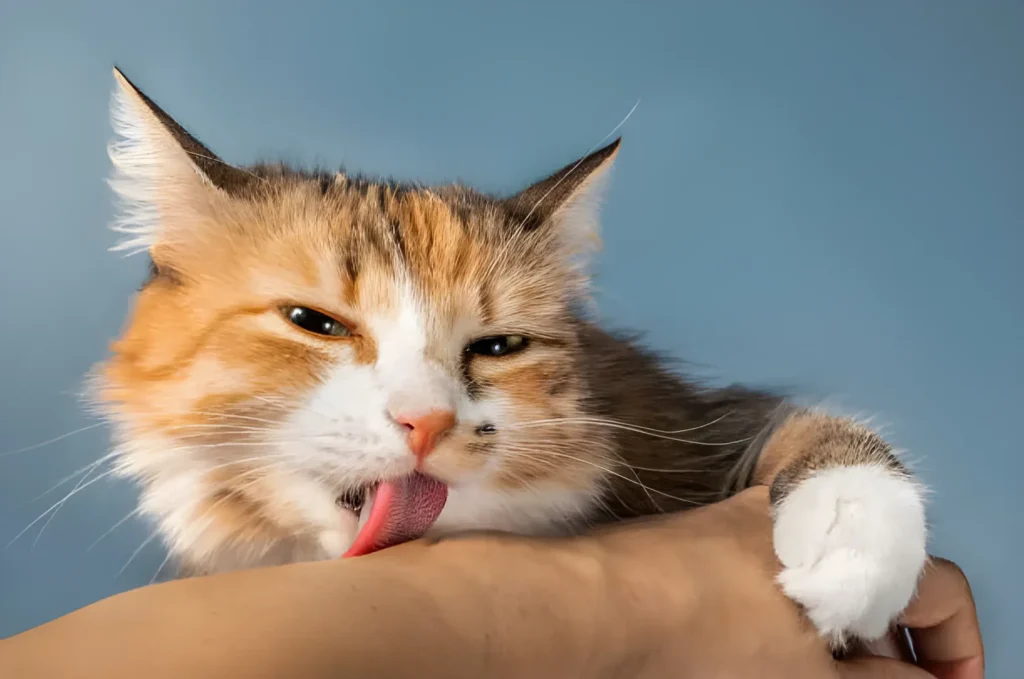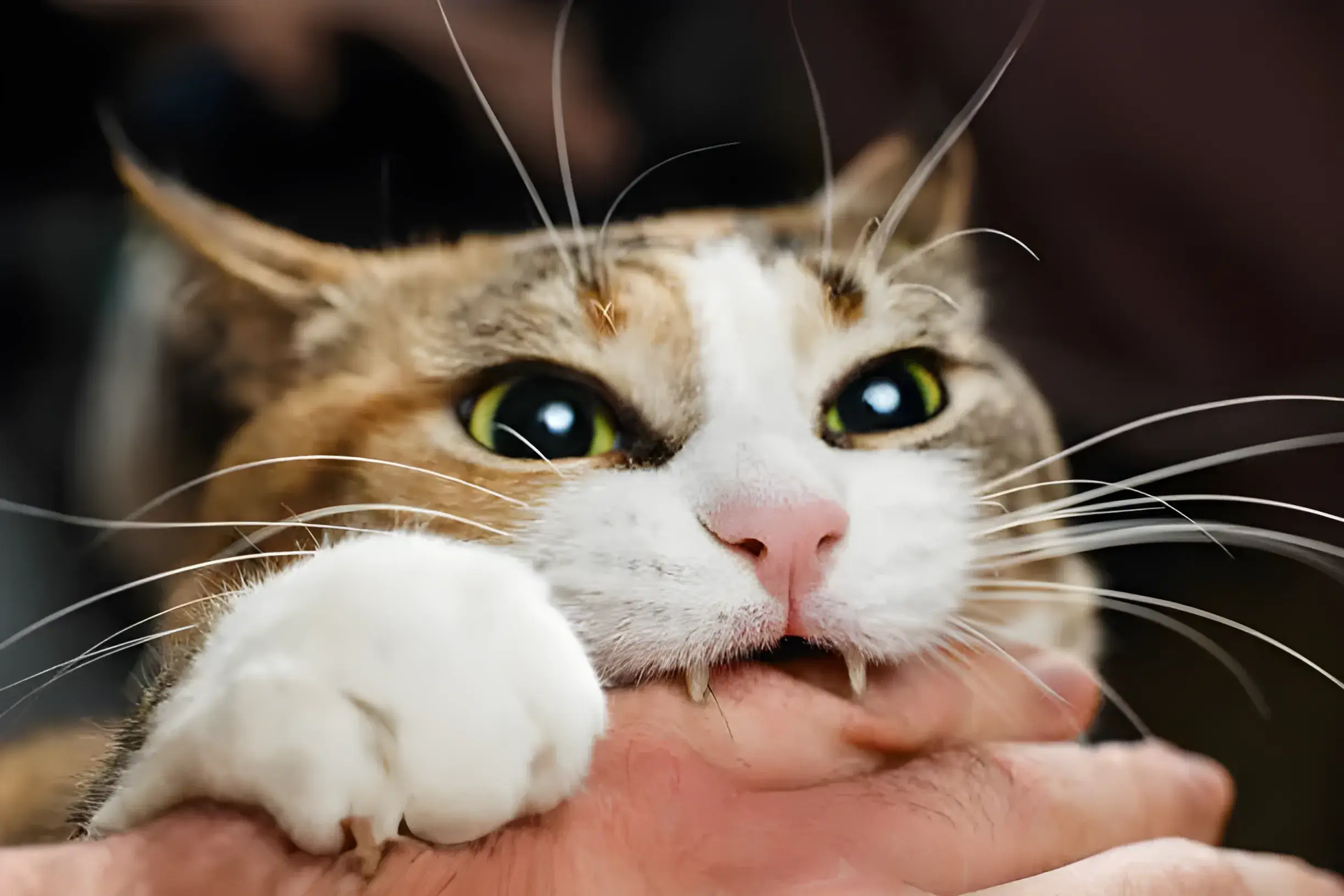Cats are fascinating creatures with a unique language. When your cat delivers a playful bite and follows it up with a few quick licks, you might be left wondering, What does it mean when cats bite then lick me? This seemingly contradictory behavior can be affection, overstimulation, or something else entirely. Unraveling the reasons behind it is key to deciphering your cat’s communications and building a stronger bond with your furry companion.
Possible Reasons Behind the Bite-Lick Combo
1. Love Bites: Cats often groom themselves and their close companions as a display of affection and trust. Your cat might be replicating this social behavior with you, using gentle nibbles and licks to say, “I love you, human.”
2. Grooming You, Too: Cats are meticulous about cleanliness. They might playfully try to extend their grooming ritual to you with a lick after a bite, incorporating you into their concept of “family.”
3. Scent Marking: Cats use their saliva to mark their territory, which includes the people they consider their own. Biting you and leaving a lingering scent through licking might be their way of claiming ownership.
4. Playtime Excitement: Cats engage in mock hunting behaviors during play. Sometimes, harmless nibbles can escalate into harder bites as their excitement builds. Licking afterward could indicate they’re just having fun, but might need a brief break to reset.
5. Stress, Anxiety, or Hidden Illness: Uncharacteristic biting and licking behavior could signal distress or underlying medical issues. Keep an eye out for:
- Changes in Environment: New living arrangements, unfamiliar pets or people, and disrupted routines are major stress triggers for cats, potentially leading to increased biting and licking.
- Pain or Discomfort: If your cat focuses their attention on a specific body area, it could indicate an issue like dental pain, allergies, or internal problems. Veterinarian consultation is crucial for this.
Decoding Your Cat’s Message: What to Observe

- Intensity of the Bite: Gentle, playful bites are different from sharp, focused nips that cause pain. The former is likely affectionate, while the latter might signal deeper issues.
- Body Language: Is your cat tense with ears flattened, tail twitching, or growling? These indicate agitation. Alternatively, a relaxed posture while biting and licking may mean simple playfulness.
- Situational Clues: Is the behavior confined to petting sessions, playtime, or entirely unprovoked? Timing provides important context about your cat’s motivations.
How to Respond and Strengthen Your Bond
- Redirection for Playful Energy: Offer interactive toys such as feathered wands, laser pointers, or stuffed mice. Channel their hunting instincts away from your hands!
- Respecting Boundaries: Learn to read signs of overstimulation. Gently disengage if your cat starts biting and licking during petting. They might need a short break and some alone time.
- Addressing Environmental Stress: If you suspect a new situation is causing anxiety, create calm spaces for your cat and try to re-establish a comforting routine.
- Seeking Professional Help: If the biting and licking become excessive, frequent, or accompanied by changes in appetite or energy levels, don’t hesitate to consult a veterinarian or cat behaviorist.
Conclusion
Understanding the motivations behind your cat’s sometimes contradictory behavior is crucial for strengthening your bond. By carefully observing their actions, learning their subtle signals, and responding with patience, you’ll forge a deeper understanding with your feline companion. This journey of discovery fosters a truly special human-animal connection.
I hope you find this article helpful and informative. If Yes’ feel free to share it with your friends!
Frequently Asked Question
Is it normal for my cat to bite me then lick me?
While it might seem strange, this behavior is fairly common. However, monitoring the intensity and context is important.
Should I stop my cat from biting and licking me?
It depends. Gentle love bites are fine, but if the biting hurts or becomes excessive, redirection and recognizing your cat’s signals are important.
Why does my cat grab my hand and lick me?
This could be an affectionate gesture or a playful way to initiate interaction. Cats might playfully grab and lick to mimic the way they would groom another cat in their social group.
Is it normal for cats to bite and lick themselves?
Meticulous grooming is essential to a cat’s well-being. If they occasionally nibble and lick themselves, it’s usually just normal grooming behavior. However, excessive focus on a specific area might signal an underlying medical problem.
Why does my cat gently bite me?
These soft nibbles are often referred to as “love bites.” It’s their way of expressing affection and bonding with you.
Why does my cat lick me then bite me while purring?
Cats don’t always communicate in linear ways. They might switch from licking to biting if they become overstimulated or simply playful. Purring is not always an indicator of pure contentment – it can occur when they’re excited too.
What does it mean when a cat bites you while petting them?
Cats can become overstimulated from touch. A gentle bite while being petted means your cat may need a break or prefers a different kind of petting.
Why do cats bite then lick themselves?
Biting and licking themselves after interacting with you could be a way for your cat to re-establish its own scent or simply continue its grooming routine.
What does it mean when a cat bites you hard?
A hard bite that causes pain usually indicates something’s wrong. It might signify stress, fear, an underlying medical issue, or a reaction to unwanted interaction.
Why does my cat bite me when I walk by?
This could be a playful ambush (redirect this to toys), a sign of territorial behavior, or a response to anxiety. Observing where, when, and how they bite when you walk past is important.

